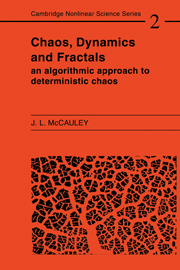Book contents
- Frontmatter
- Dedication
- Contents
- Preface
- Miscellaneous Frontmatter
- Introduction
- 1 Flows in phase space
- 2 Introduction to deterministic chaos
- 3 Conservative dynamical systems
- 4 Fractals and fragmentation in phase space
- 5 The way to chaos by instability of quasiperiodic orbits
- 6 The way to chaos by period doubling
- 7 Introduction to multifractals
- 8 Statistical mechanics on symbol sequences
- 9 Universal chaotic dynamics
- 10 Intermittence in fluid turbulence
- 11 From flows to automata: chaotic systems as completely deterministic machines
- Bibliography
- Index
3 - Conservative dynamical systems
Published online by Cambridge University Press: 05 October 2013
- Frontmatter
- Dedication
- Contents
- Preface
- Miscellaneous Frontmatter
- Introduction
- 1 Flows in phase space
- 2 Introduction to deterministic chaos
- 3 Conservative dynamical systems
- 4 Fractals and fragmentation in phase space
- 5 The way to chaos by instability of quasiperiodic orbits
- 6 The way to chaos by period doubling
- 7 Introduction to multifractals
- 8 Statistical mechanics on symbol sequences
- 9 Universal chaotic dynamics
- 10 Intermittence in fluid turbulence
- 11 From flows to automata: chaotic systems as completely deterministic machines
- Bibliography
- Index
Summary
Integrable conservative systems: symmetry, invariance, conservation laws, and motion on invariant tori in phase space
Systems that show instability with respect to small changes in initial data were neither studied nor taught in most physics departments until nearly two decades after Lorenz's discovery of the butterfly effect. The reason for this is in part that classical mechanics was regarded by many physicists as a dead subject and was often taught mainly as preparation for the study of quantum mechanics: dissipative systems were largely ignored and the study of Hamiltonian mechanics was restricted to a very special case, that of completely integrable (or just ‘integrable’) systems. Mechanics was typically taught as if there were no systems other than the integrable ones. One reason for this was the very strong influence of progress that had been made in quantum theory by studying systems that were completely solvable by using symmetry. Whenever you can solve a dynamics problem by symmetry, then the system is called integrable, or ‘completely integrable’. This terminology has been used in quantum as well as in classical mechanics, and for the same reason: in both cases, the method proceeds by finding a (finite) complete set of commuting infinitesimal generators (complete set of commuting operators).
Information
- Type
- Chapter
- Information
- Chaos, Dynamics, and FractalsAn Algorithmic Approach to Deterministic Chaos, pp. 85 - 126Publisher: Cambridge University PressPrint publication year: 1993
Accessibility standard: Unknown
Why this information is here
This section outlines the accessibility features of this content - including support for screen readers, full keyboard navigation and high-contrast display options. This may not be relevant for you.Accessibility Information
- 2
- Cited by
